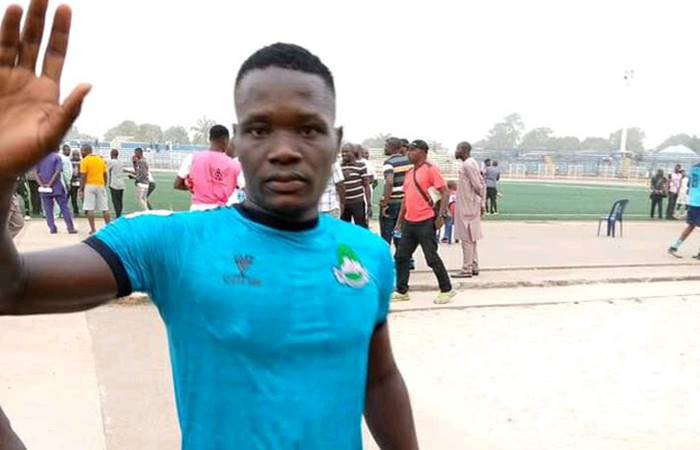
In a groundbreaking judgment that has sent shockwaves through Nigerian football, the National Industrial Court of Nigeria has officially ruled that the tragic death of Chineme Martins in 2020 was a result of gross negligence by several key football authorities, including his club Nasarawa United, the Nigeria Professional Football League (NPFL), the Nigeria Football Federation (NFF), and the match commissioner in charge of the ill-fated fixture.
Chineme Martins, a promising 25-year-old defender, collapsed on the pitch during a league match at the Lafia Township Stadium on March 8, 2020. Despite immediate attempts to revive him, Martins was tragically pronounced dead — a moment that not only devastated his family and teammates but also exposed alarming gaps in Nigeria’s football safety protocols.
After a prolonged legal battle lasting over five years, the court’s verdict on Tuesday emphatically blamed the grossly inadequate medical preparedness at the stadium and failure to adhere to standard player health procedures as the primary causes that led to Martins’ untimely demise.
Court Unveils Disturbing Findings on Matchday Medical Facilities
During the court proceedings, it was revealed that at the time of the incident, the match proceeded under conditions that were shockingly devoid of the most basic medical support. According to a 2020 investigative report published by the NFF itself, the Lafia Township Stadium lacked a stationed medical doctor, a physiotherapist, and even a functional ambulance — essential safety provisions mandated by FIFA and global football governing standards.
The presiding judge, while delivering the verdict, described it as “reprehensible and inexcusable” that a professional football match within the country’s top league could proceed without such critical health and emergency support systems in place.
No Medical Screening Conducted on Martins for Three Seasons
Perhaps most alarming in the court’s findings was that Nasarawa United FC had reportedly failed to conduct essential cardiovascular and general medical screenings on Chineme Martins throughout his three seasons at the club. Notably, an echocardiogram — a standard heart function test capable of detecting latent cardiac issues common among athletes — was never performed on the defender.
This oversight was ruled as a severe breach of duty of care on the part of Nasarawa United, contravening both national regulations and international best practices for player health and safety in professional sports.
Collective Negligence by NPFL, NFF, and Match Officials
The court further ruled that responsibility for Martins’ death extended beyond Nasarawa United, highlighting systemic negligence by the NPFL, the Nigeria Football Federation, and the match commissioner on duty that day. Their collective failure to enforce compliance with basic medical safety standards directly contributed to the fatal outcome.
ALSO READ: Drama Unfolds in Adamawa as FC Basira Defeat Baffa Boys Amid Red Cards and Chaos
According to the ruling, these football governing bodies neglected their supervisory and regulatory responsibilities, effectively allowing an unsafe environment to persist — one that ultimately claimed the life of a young, talented footballer.
FIFPRO and Family React to the Landmark Verdict
International footballers’ union, FIFPRO, which provided legal support to Martins’ family throughout the lengthy proceedings, lauded the court’s decision as a crucial milestone in the fight for improved player welfare in Nigeria and across Africa.
Martins’ brother, Michael Martins, speaking to the media after the verdict, expressed relief and a sense of long-awaited justice.
“The court has spoken and ruled that Nasarawa United, the league management company, and the NFF did not prioritize my brother’s safety, health, and welfare — factors that contributed to his death. This ruling brings a sense of closure to our family, but also serves as a wake-up call for authorities to prioritize player safety going forward,” he stated.
A Landmark Case in Nigerian Football History
This ruling stands as an unprecedented moment in Nigerian football history — marking the first time a court has held multiple football authorities legally accountable for a player’s death on the field. It serves as a grim yet powerful reminder of the importance of enforcing comprehensive medical protocols and safety standards within the sport.
Health and safety experts, as well as former professional footballers, have since renewed calls for urgent reforms within the NPFL and across all levels of football in Nigeria to prevent similar tragedies in the future.
A Cautionary Tale for African Football
The tragic incident and its judicial aftermath highlight a widespread problem in African football, where infrastructure challenges and poor medical readiness have often put players at risk. As Nigeria, a nation passionate about football, continues to invest in the sport, Martins’ death — and this ruling — should trigger lasting reforms to prioritize player health, enforce strict matchday medical protocols, and hold all stakeholders accountable.
Conclusion
The National Industrial Court’s decision not only delivers long-awaited justice for Chineme Martins and his family but also shines a necessary spotlight on the urgent need for structural reforms within Nigerian and African football. Going forward, stakeholders at every level of the sport must ensure that comprehensive health and safety protocols are not merely recommended but are strictly enforced, to protect the lives and careers of players across the country.











 Manchester United Eye Royal Antwerp Goalkeeper Senne Lammens in Potential Late Transfer Window Move
Manchester United Eye Royal Antwerp Goalkeeper Senne Lammens in Potential Late Transfer Window Move  Brentford Signs Dango Ouattara in Club-Record Deal
Brentford Signs Dango Ouattara in Club-Record Deal  Nottingham Forest Confirms Signing of James McAtee from Manchester City in £30m Deal
Nottingham Forest Confirms Signing of James McAtee from Manchester City in £30m Deal  Tottenham Hotspur Transfer News: Eberechi Eze Deal Edging Closer with Crystal Palace Price Revealed
Tottenham Hotspur Transfer News: Eberechi Eze Deal Edging Closer with Crystal Palace Price Revealed  Manchester City Transfer News: Pep Guardiola Calls for Squad Overhaul Amid Premier League Win
Manchester City Transfer News: Pep Guardiola Calls for Squad Overhaul Amid Premier League Win  Liverpool Transfer News: Arne Slot Labels Federico Chiesa ‘Unsellable’ as Attacking Depth Assessed
Liverpool Transfer News: Arne Slot Labels Federico Chiesa ‘Unsellable’ as Attacking Depth Assessed  Arsenal’s Key Signings: Noni Madueke and Martin Zubimendi Set to Shine in Title Fight
Arsenal’s Key Signings: Noni Madueke and Martin Zubimendi Set to Shine in Title Fight  Nottingham Forest Transfer News: Nuno Espirito Santo Voices Squad Concerns Ahead of New Season
Nottingham Forest Transfer News: Nuno Espirito Santo Voices Squad Concerns Ahead of New Season